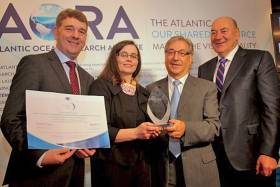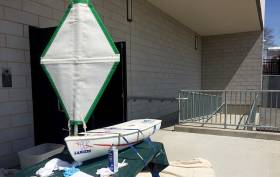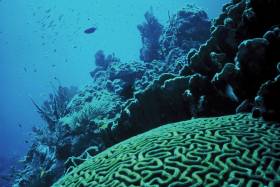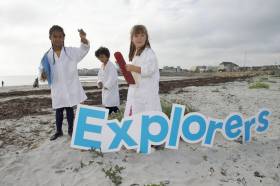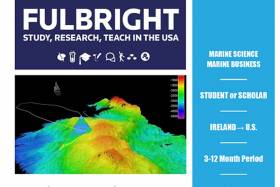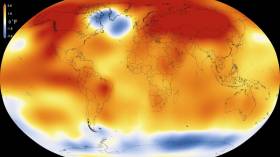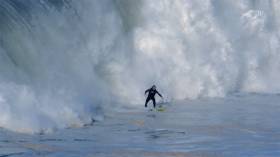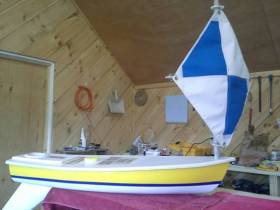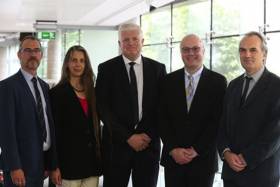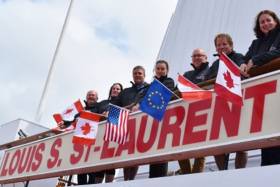Displaying items by tag: marine science
Atlantic Ocean Research Alliance Project Wins International Award
#MarineScience - The Atlantic Ocean Research Alliance Co-ordination and Support Action (AORA-CSA) has received the first Atlantic Project Award for International Cooperation.
The Marine Institute-led project was presented with the accolade yesterday (Tuesday 27 September) during the Atlantic Stakeholders Conference at the Croke Park Conference Centre.
Karmenu Vella, European Commissioner for Environment, Maritime Affairs and Fisheries, presented the award to Dr Peter Heffernan and Dr Margaret Rae of the Marine Institute, the lead partner in the Horizon 2020-funded project to implement the Galway Statement on Atlantic Ocean co-operation and support the emerging blue economy.
Marine Minister Michael Creed highlighted the importance of the Atlantic Strategy to Ireland in his address to the conference, which aims to promote entrepreneurship and innovation as a hub for participants to make valuable contacts and explore areas for co-operation, share information and good practices, promote and identify new ideas as well as funding opportunities and partnerships for their projects.
"Just over half of the 400-plus delegates at the conference today are Irish, many of them SMEs, which shows the importance of the Atlantic Strategy to Ireland and the significant opportunities it represents,” said Dr Heffernan, the Marine Institute’s chief executive.
“Irish SMEs have the chance to meet face to face with potential research partners and investors, and to work together on ideas for novel marine projects at the networking and matchmaking activities here today.”
The Atlantic Strategy has influence on the European Union’s innovation and funding programmes, including the Horizon 2020 framework programme for research, the European Maritime and Fisheries Fund (EMFF) and the InterReg programme.
"Irish marine researchers have been very successful in winning blue growth research funding, with 5% of the available budget under Horizon 2020 in 2014 going to Irish researchers,” said Dr Heffernan. “Irish marine research projects benefitted from €5.6m funding and resulted in the creation of about 41 research jobs.
"Irish researchers had an equally strong performance in 2015, winning €2.86m in competitive funding, representing 4.7% of the total EU budget in this area."
Seven Irish research organisations were funded under the 2015 calls, with NUI Galway winning nearly €1m for a number of marine research projects.
Another notable Irish success was Brandon Bioscience Ltd, funded under the SME instrument as partners in the SEA MORE YIELD project to commercialise a novel biotech solution to yield losses in oil seed crops using native Irish seaweed.
The Atlantic Strategy Group, which oversees the implementation of the EU's Atlantic Strategy, is currently chaired by Ireland and made up of relevant member states (Ireland, UK, France, Portugal, and Spain), the European Parliament and the European Commission, as well as regional representatives.
Unmanned Mini Yacht Found In Connemara After Search Appeal
#Unmanned - Following our previous alert for an unmanned yacht off the Galway coast, the mini-yacht has been found after making landfall.
Kaitlyn Dow's self-built vessel Lancer was launched off the US coast four months ago as part of a high-school marine science project.
The now final-year student at Waterford High School in Connecticut tracked her sailboat by GPS across the Atlantic as it inched towards Galway Bay and Connemara.
It was finally recovered this past Saturday 17 September by eight-year-old Maedhbh Ní Ghionnáin on an island near her home in Lettermore, as The Day reports.
After her aunt received an email from Dow asking for any details of her boat's whereabouts, Maedhbh's family had been keeping a lookout before they found it on a beach virtually on their doorstep.
“In the middle of the day we went walking by the sea, and then we saw this white thing,” said Maedhbh, who also shared the story of her remarkable discovery with Raidió na Gaeltachta.
The news comes a month after another unmanned research sailboat was reported off the Kerry coast after nearly three years in the North Atlantic.
Registration Open For Stakeholder Meeting On Marine Biotech Roadmap
#MarineScience - The Marine Biotechnology ERA-NET will hold a stakeholder meeting, coinciding with the launch of the recently completed European Marine Biotechnology Research and Innovation Roadmap, on 12-14 October 2016 at the Hotel Marivaux in Brussels.
The stakeholder meeting builds on the key elements of the roadmap and will feature a wide range of speakers from international industry and the research community.
This event will run from 9am to 5pm on Thursday 13 October and from 9am to 1pm on Friday 14 October and comprises six sessions:
Session 1: Marine biotechnology, an industry perspective. With the aim of stimulating innovations based on the use of marine biotechnology to explore and maximise the use of marine bio-resources, speakers from different industry sectors will describe how they use a range of novel marine materials in commercial applications.
Session 2: Creating a marine biotechnology business. The challenges of building a business venture based on marine biotechnology are the focus of this session, which includes presentations on financing a new biotechnology enabled venture, managing knowledge transfer and intellectual property in addition to case studies presented by two marine biotechnology driven high-potential SMEs providing novel products to vastly different global markets.
Session 3: Supporting marine biotechnology RTDI. Leading industry practitioners will will give their perspectives on the future opportunities to develop new research tools and infrastructure; novel processes and applications in the health, food and food ingredients sectors.
Session 4: ERA-MBT and other EU supported marine biotechnology projects. Participants will learn of the impacts and outputs from some of Europe's major publicly funded marine biotechnology research projects and hear of the progress on projects funded by the first ERA-MBT call for research proposals.
Session 5 & 6: Future research opportunities and setting priorities. Highly interactive sessions will focus on mechanisms to support marine biotechnology and set priorities for marine biotechnology research and innovation.
The launch of the Marine Biotechnology Research and Innovation Roadmap will be held on Wednesday 12 October at 4pm followed by a networking cocktail at 6pm.
The roadmap highlights research and innovation as spanning scientific, technological, economic and societal challenges and sets a marine biotechnology research and innovation agenda to 2030.
It identifies five thematic areas; the first three enable exploration of the marine environment; support biomass production and processing; and contribute to product innovation and differentiation. Two other themes, policy support and stimulation; and the provision of enabling technologies and infrastructure; provide the foundation to support growth in the Blue Bioeconomy.
National and European policy organisations can use the roadmap in developing measures to maximise the contribution of the ocean's bio-resources to the bio-economy and societal welfare, and funding agencies can use it to identify marine biotechnology related research themes.
The stakeholder meeting and roadmap launch is open for all stakeholders and can be attended for free. The number of places is limited and will be allocated on the first come, firstserved basis. Participants are required to register before Monday 26 September.
For programme details, online registration and accommodation information, see the MarineBiotech website HERE.
Primary Schools' Marine Education Programme Expands
#MarineScience - The Marine Institute’s Explorers Education Programme is growing and is now available in Galway, Clare, Mayo, Cork and Waterford, delivered by centres including Galway Atlantaquaria, Loop Head Summer Hedge School, Redrose Developments, Lifetime Lab and Oceanic Surf School and the Marine Education Centre.
The centres will be introducing marine-based education modules to more than 3,000 primary school children during the next school year (2016-2017), promoting the importance of our ocean through saltwater aquariums in classrooms, seashore safaris, marine projects, marine workshops and special science and art projects.
Marine Institute chief executive Dr Peter Heffernan congratulated the centres on joining the Explorers Education Programme, highlighting that “their expertise and enthusiasm for our oceans provides an important platform for teaching marine themes in the classroom and helps to support and reconnect teachers and their students with the marine environment.
“As an Island nation with a seabed territory 10 times greater than the size of the island of Ireland, it is fundamental that we realise the value, opportunities and social benefits the ocean provides us.
"On a daily basis the ocean produces over half the oxygen we breath, provides us with food and supports the tiniest microscopic plants to the largest animals on earth. It is therefore essential that we learn about the influence the ocean has on us and the influence we have on the ocean."
As part of the development of the programme, Galway Atlantaquaria – Ireland's national aquarium – has been contracted to provide professional development training and workshops for teachers in schools as well as assist with workshops for trainee teachers at DCU-St Patrick’s, introducing marine themes into the curriculum.
“Recognising the unique position teachers have to inspire their students, the institute welcomes the opportunity to help teachers generate curiosity among their students to learn more about our ocean wealth as well as realize some of the amazing marine career opportunities,” said Cushla Dromgool-Regan, responsible for the strategic development of education at the Marine Institute.
Details of Explorers Education Programme modules and the centre contacts are available at www.explorers.ie. Booking to take part in the modules is essential and teachers should contact the relevant outreach centres listed on the site.
Centres selected to represent the Explorers Education Programme were chosen in line with the public sector procurement guidelines. The programme is supported by the Marine Institute and is funded under the Marine Research Programme by the Irish Government.
Applications Open To Marine Researchers For Fulbright-Marine Institute Award
#MarineScience - The Fulbright Commission and the Marine Institute are offering a unique opportunity for an Irish PhD candidate or scholar to travel to the US to research in the fields of marine science or marine-related business sector.
The commission is particularly interested in receiving applications for this award from candidates who are exploring:
- Marine Sensor Technologies and Observation Systems
- Maritime Economics
- Marine Spatial Planning, Maritime Law and Security
- Renewable Ocean Energy
- Marine Biotechnology (including Functional Foods)
- Marine Environment
- Oceanographic Modelling
- Shipping, Seafood Safety, and
- Ecosystems-based Fisheries Management
Fulbright Irish Awards offer funding and administrative support for Irish citizens and EU citizens (resident in Ireland for more than three years) to study, research or teach/lecture in the USA for a period of four months or one semester, up to one year.
The application period is now open with a deadline is 4pm on Friday 28 October.
Details of the 2017-2018 Fulbright-Marine Institute Award to conduct postgraduate research in the US in all fields of marine science or marine-related business sector are available at the Marine Institute website HERE.
Fulbright staff will hold a webinar giving general information on the Fulbright Irish Awards at 1pm next Tuesday 13 September – email [email protected] if you would like to register.
Fulbright award managers can be reached on 01 660 7670 or at [email protected] to answer application queries. Fulbright Ireland ambassadors are also available to give on-campus support.
Ocean Warming Poses Threat To Marine Wildlife & Food Chain
#OceanWarming - Warming oceans are not only throwing marine ecosystems into disarray, but are also encouraging the spread of water-borne bacteria and viruses around the world, a new study warns.
The Irish Examiner reports on new findings from the International Union for Conservation of Nature (IUCN), which says the world is "completely unprepared" for the consequences of ocean warming, which have already been seen as fish and marine mammal species move into cooler northern waters.
Coming in their wake, however, are tropical pathogens such as Vibrio vulnificus, related to the cholera bacteria, and potentially toxic algal blooms that could enter the food chain – comprising what scientists are calling the "greatest hidden challenge of our generation".
Rising sea temperatures are already wreaking havoc on corals off East Africa in the Indian Ocean, and affecting the breeding success of seabirds, ocean reptiles, jellyfish and plankton – the foodstuff of large baleen whales and basking sharks, which frequent Irish shores.
The Irish Examiner has more on the story HERE.
New Big Wave Hotspot Discovered Off Irish Coast
#Surfing - Chasing the most challenging swells is the dream of the world's top big wave surfers, who've made an art of determining where the tallest walls of water can be found.
But now one Irish coastal regular reveals how he turned to science for his discovery of a new secret hotspot off the North West.
As Mail Online reports, Andrew 'Cotty' Cotton consulted with weather analysts and oceanographers in poring over satellite data to find the offshore sweet spot – generating waves that averaged some nine metres, or 30 feet – after the stormy winter of late 2014.
However, the Devon surfer believes the location could produce swells more than twice that size – and may even break the record for the biggest wave ever surfed as set at Nazaré in Portugal by Garrett McNamara in 2013.
Cotty's quest is the subject of a new documentary on RedBull.tv, while Mail Online has much more on the story HERE.
Unmanned Research Boat Spotted Off Kerry Coast
#Unmanned - A miniature unmanned sailing boat has been reported off the Kerry coast after nearly three years in the North Atlantic.
The boat, named West, is part of the Educational Passages project by the Middle School of Westbrook in Maine, USA and is one of five boats the Sebago School Alliance sent out in the autumn and winter of 2013-14.
West was launched off Georges Bank along with one other boat by Bro Cote, a lobsterman out of Hyannis, Massachusetts. Several others were launched about the same time off the Mid-East coast of the United States and off the Canary Islands for the marine science project.
“We had hoped the boat would make the complete circle of the Atlantic Ocean. It has and then some,” say the project organsiers about West, which has been spotted 32 nautical miles from the Kerry coastline.
West could arrive in the Kerry area over the next few days or, depending upon weather conditions, may go further northwards towards the Galway coast.
Previously West made landfall in November 2014 when it crashed on rocks in rough seas off Portugal, where it was recovered by local authorities and repaired with the help of local companies and relaunched from Lisbon in June last year.
Four months later, it was recovered entering the Mediterranean, refurbished again and put on a cargo ship to Madeira and relaunched from there on 28 January this year.
The project co-ordinators have asked for assistance to help rescue the boat when it arrives in the coming days
“It would be great if the boat could be recovered at sea or shortly after landing to avoid damage."
Researchers At NUIG & UCC Win SFI-Marine Institute Funding
#MarineScience - Two marine science projects will be funded as part of €40 million in research funding for 24 major projects as announced yesterday (Wednesday 3 August) by Minister for Innovation Mary Mitchell-O'Connor.
Distributed via the Science Foundation Ireland's Investigators Programme, the investment supports world-class research in key priority areas for Ireland, with co-funding for seven of the projects provided by the Department for the Economy, Northern Ireland; the Geological Survey of Ireland; the Environmental Protection Agency; and the Marine Institute, which is co-funding two key research projects as part of the programme.
Dr Louise Allcock of NUI Galway has been awarded €1,940,000 to investigate deep sea corals and sponges to identify novel natural products in Ireland's offshore waters and increase knowledge of their economic value and distribution.
Dr Allcock also aims to produce predictive maps of biodiscovery potential to maximise the economic impact of future biodiscovery work.
Meanwhile, Dr Philip McGinnity of University College Cork has been awarded €1,709,500 to investigate interactions between wild and farmed salmon, and aims to develop a predictive methodology to inform environmental best practice to secure long-term sustainability of global wild and farm fish populations.
With awards ranging from €500,000 to €2.7 million over four- to five-year periods, projects funded by the Investigators Programme will support more than 200 researchers overall.
"This funding provides an important platform for researchers to advance their investigations and further enhance Ireland's reputation for excellence in sectors such as health, agriculture, marine, energy and technology," said Minister Mitchell-O'Connor.
"Engaging with 39 companies, the programme offers researchers the opportunity to develop their careers, as well as providing industry collaborators with access to the wealth of outstanding expertise and infrastructure found throughout the island.
The minister added: "The alignment of the Investigators Programme with Horizon 2020, the European Union's research funding programme, will lead to further successes in leveraging EU resources and increasing international collaboration.
"The projects within this programme clearly demonstrate excellent and impactful research which is a key goal of the Government's science and innovation strategy, Innovation 2020."
Dr Ciaran Kelly, marine research and development manager at the Marine Institute, said: "We're delighted to partner with Science Foundation Ireland to co-fund this important research to build capacity in key areas such as deep sea biodiscovery, and aquaculture and genetics.
"These research projects will help to maximise the benefits of our ocean resources to society, while ensuring the long-term sustainability of these activities."
Transatlantic Seabed Mapping Survey Now Under Way
#SeabedMapping - The Atlantic Ocean Research Alliance's fifth transatlantic seabed mapping survey launched last Friday 22 July from eastern Canada.
Sailing on the Canadian Coast Guard Ship Louis S St-Laurent, the team will map the seafloor across the North Atlantic between Halifax in Nova Scotia and Tromso in Norway till next Tuesday 2 August.
The marine science team led by Paola Travaglini of Fisheries and Oceans Canada's Hydrographic Service are using state-of-the-art deep-water multibeam sonar technology to survey the seabed and study the physical characteristics of the seafloor, as well as other oceanographic data such as temperature and salinity, to better understand little-known areas of the North Atlantic and build on the work done last summer.
These surveys support the Galway Statement on Atlantic Ocean Co-operation, the goals of which are to join resources of its three signatories to better understand the North Atlantic, to promote sustainable management of its resources, and to promote citizens' understanding of the Atlantic through ocean literacy.
Participants in the survey include Fisheries and Oceans Canada's Hydrographic Service, the University of New Hampshire's Center for Coastal and Ocean Mapping Joint Hydrographic Center, and the Fisheries and Marine Institute of Memorial University of Newfoundland.
Students and early-career scientists representing Canada and the United States sailing on board the CCGS Louis S St-Laurent are writing daily blog posts to chronicle the mission. The team comprises:
- David Thornhill, Hydrographer, Fisheries and Oceans Canada Canadian Hydrographer Service
- Danielle Roche, Marine Institute of Memorial University of Newfoundland
- Darren Hiltz, Hydrographer, Fisheries and Oceans Canada Canadian Hydrographer Service
- Elizabeth Weindren, University of New Hampshire's Center for Coastal and Ocean Mapping Joint Hydrographic Center Fisheries
- Chris Hemmingway, National Director of UNCLOS, Fisheries and Oceans Canada Canadian Hydrographer Service
- David Levy, Electrical Technician, Fisheries and Oceans Canada Canadian Hydrographer Service
- Paola Travaglini, Hydrographer–In–Charge, Fisheries and Oceans Canada Canadian Hydrographer Service
Seabed mapping was one of the ocean research priorities and challenged discussed by the Marine Institute's CEO Dr Peter Heffernan with other heads of European marine science institutes in Ostend earlier this month, which followed a previous consultation that identified such mapping as crucial for managing human activities in our seas.



























